
Texas hold 'em is one of the most popular variants of the card game of poker. Two cards, known as hole cards, are dealt face down to each player, and then five community cards are dealt face up in three stages. The stages consist of a series of three cards, later an additional single card, and a final card. Each player seeks the best five-card poker hand from any combination of the seven cards: the five community cards and their two hole cards. Players have betting options to check, call, raise, or fold. Rounds of betting take place before the flop is dealt and after each subsequent deal. The player who has the best hand and has not folded by the end of all betting rounds wins all of the money bet for the hand, known as the pot. In certain situations, a "split pot" or "tie" can occur when two players have hands of equivalent value. This is also called "chop the pot". Texas hold 'em is also the H game featured in HORSE and HOSE.

Mike A. Caro is an American professional poker player, pioneer poker theorist, author of poker books, and casino executive.
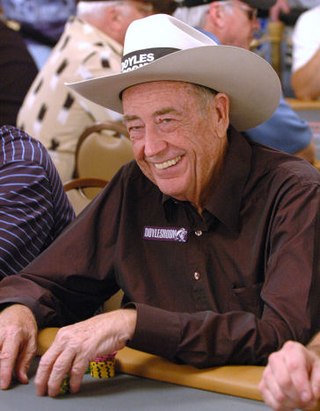
Doyle Frank Brunson was an American poker player who played professionally for over 60 years. He was a two-time World Series of Poker (WSOP) Main Event champion, a Poker Hall of Fame inductee, and the author of several books on poker.

David Sklansky is an American professional poker player and author. An early writer on poker strategy, he is known for his mathematical approach to the game. His key work The Theory of Poker presents fundamental principles on which much later analysis is based.
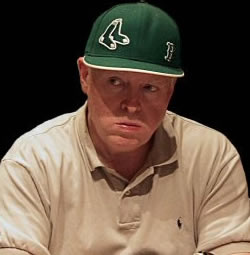
Dan Harrington is a professional poker player, best known for winning the Main Event at the 1995 World Series of Poker. He has earned one World Poker Tour title, two WSOP bracelets, and over six million dollars in tournament cashes in his poker career. He is also a member of the Poker Hall of Fame.

Bobby Baldwin is a professional poker player and casino executive. As a poker player, Baldwin is best known as the winner of the 1978 World Series of Poker Main Event, becoming the youngest Main Event champion at that time.

David Edward "Chip" Reese was an American professional poker player and gambler from Centerville, Ohio. He is widely regarded as having been the greatest cash game poker player.
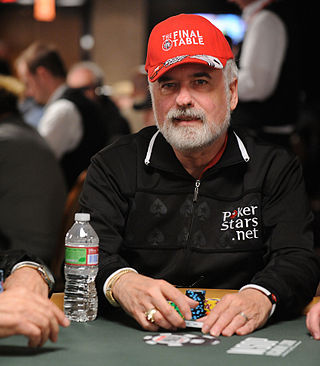
Thomas K. McEvoy is a professional poker player, author and member of the Poker Hall of Fame, 2013 inductee. He is best known for winning the 1983 World Series of Poker Main Event.
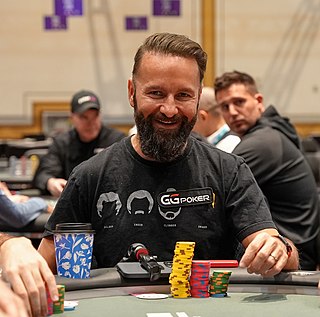
Daniel Negreanu is a Canadian professional poker player who has won seven World Series of Poker (WSOP) bracelets and two World Poker Tour (WPT) championship titles. In 2014, independent poker ranking service Global Poker Index recognized Negreanu as the best poker player of the previous decade.

Todd Alan Brunson is an American professional poker player and the son of poker player Doyle Brunson. Doyle Brunson did not teach Todd how to play; it was not until he was studying law at Texas Tech University that he learned how to play on his own. Before his senior year, he dropped out of school to turn professional.
BARGE, the Big August Rec.Gambling Excursion, is a yearly convention held in Las Vegas during the summer, usually a weekend in late July or the first weekend of August. It consists of a series of tournaments both of poker and other gambling games, as well as a banquet and a host of informal social and gambling activities organized by attendees. Some of the well-known poker players who have participated either as speakers or players in the no limit holdem tournament include: Howard Lederer, Chris Ferguson, Phil Hellmuth Jr, Greg Raymer, Mason Malmuth, David Sklansky, Mike Caro, Matt Matros, Linda Johnson, Phil Gordon, Paul Phillips, Andy Bloch, William Chen, Doyle Brunson and many others.
In no-limit or pot-limit poker, a post-oak bluff is a very small bet relative to the size of the already-existing pot. This type of bluff may be employed as an attempt at using reverse psychology to steal the pot. It holds comparatively little risk for the player making the bet. The term was popularized by Doyle Brunson in his 1979 book Super System.
The Big Game is a high-stakes poker cash game played in "Bobby's Room", a cardroom named after Bobby Baldwin, at the Bellagio casino in Las Vegas. In 2010, the game partially expanded to "The Ivey Room" at Aria Resort and Casino. The table features no-limit and pot-limit games with wagers up to $100,000 per hand. Limit games as high as $4,000/$8,000 are often played but $800/$1,600 is normal.
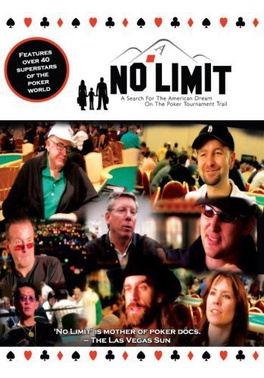
No Limit: A Search for the American Dream on the Poker Tournament Trail is a 2006 documentary film about the professional poker tournament circuit. The film follows producer Susan Genard as she enters several Seven-Card Stud Hi/Lo and Omaha poker tournaments across the country. Dozens of professional poker players appear in the film. No Limit features interviews with over 40 of the top players in the world. No Limit had its premiere screening at The Palms Hotel and Casino on July 27, 2006, and toured the film festival circuit. The film was released on DVD in October 2006. Interview subjects include:
Doyles Room was an online poker room created in 2004. The site was named after Doyle Brunson, a poker professional. In October 2011, Americas Cardroom acquired Doyles Room. Brunson had recently cut ties with Doyles Room following the domain seizures of PokerStars, Absolute Poker, Full Tilt Poker, and Ultimate Bet on April 15, 2011, by the Department of Justice, in United States v. Scheinberg.
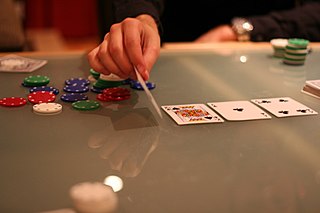
Community card poker refers to any game of poker that uses community cards, which are cards dealt face up in the center of the table and shared by all players. In these games, each player is dealt an incomplete hand face down, which are then combined with the community cards to make a complete hand. The set of community cards is called the "board", and may be dealt in a simple line or arranged in a special pattern. Rules of each game determine how they may be combined with each player's private hand. The most popular community card game today is Texas hold 'em, originating sometime in the 1920s.
The card game of poker was developed in the United States at some point during the early 19th century, drawing its name and basic concept from much earlier European games. Since its early beginnings, poker has grown to become an extremely popular pastime throughout the world.
This is an alphabetical list of poker topics.
Greek hold 'em is a community card poker game variant of Texas hold 'em which transitioned into Omaha hold 'em. Greek hold 'em combines the rules of Texas hold 'em and current day Omaha hold 'em. In professional poker player Doyle Brunson's book, Super/System, this version of poker was referred to as tight hold 'em.












